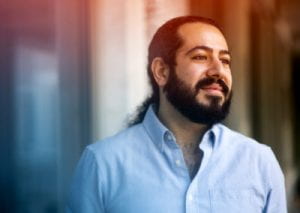Traditional mechanics studies the flow of simple fluids like air and water, but real-life fluids; blood, food, oil, and gas – known as complex fluids (because they include additional components making them different from simple fluids), have captured the attention of Dr. Safa Jamali, an associate professor for the Mechanical and Industrial engineering department at the College of Engineering at Northeastern. We spoke to Dr. Jamali to find out how the prediction of fluid flow mechanics can solve real-world problems, from optimizing your shampoo’s consistency to identifying drug biomarkers.
Dr. Jamali’s lab tries to predict the behavior of these fluids on a macroscopic level using computational science – the use of mathematical models and advanced computers to analyze and solve complex problems. His research is making waves in the industry and led to his partnership with the Center for Research Innovation (CRI).
Dr. Jamali believes that optimizing simulations of how complex fluids work in the real world could be very well leveraged in industry and find varied applications. His project started in partnership with Proctor and Gamble, conducting experiments to understand the properties of a common household item, Head and Shoulders shampoo. The behavior of this complex fluid can have an impact on the manufacturing of the product and its shelf life. This was a perfect proof of concept of how their findings could be turned into marketable research, and led to their collaboration with CRI. Since then, he has further developed his project, RhIMLIES; a project centered around providing engineering solutions to complex fluids and materials across different industries.

.Photo by Matthew Modoono/Northeastern University
Data-driven science can substantially reduce years of analysis work to a few months, and Dr. Jamali realized that “ our future is future of computational science ”. This realization motivated him to shift from experimental research to more computational work during his PhD. This led him to put in extra efforts to learn coding and apply this to develop personalized software to measure material properties – a truly inspiring endeavor.
Dr. Jamali’s motivation to stay in academia is the freedom to pursue scientific curiosity and the liberty to ask questions. He is also one of those academic researchers who turned their purely fundamental research into a commercial application. When asked about his advice to young entrepreneurial scientists, he said, “Science teaches us to be open minded, curious and courageous in its pursuit. Students should be open to new ideas and take initiative fill a gap in knowledge.”
